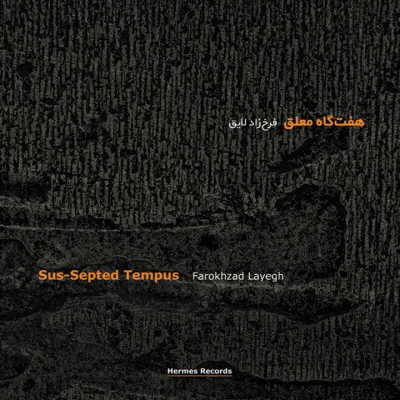The Story
Sus-Septed or “Haft Gāh-e Mua’llaq” is a work for a string quartet, recorded asynchronously. Arsalan Kamkar performs the parts for first, second, and viola, while the cello lines are brought to life by Farokhzad Layegh, the composer. In the words of Farokhzad Layegh: “Haft Gāh-e Mua’llaq offers a modest reflection on the suspension of our upturned existence. It marks my second ‘suspended’ endeavor to explore and expand the concept of ‘volume’ within the framework of Iranian modal music.”
Sus-Septed Tempus V | Amsterdam Sinfonietta
Review from "Murovat"
“…The composer’s approach and the final product before us, Haft Gāh-e Mua’llaq, clearly indicate that we are undoubtedly facing an avant-garde movement. Dr. Layegh’s experimental music is tradition-breaking and pioneering. We can identify all the factors that prominent art theorists like Peter Bürger have outlined regarding the elements necessary for avant-garde music in Farrokhzad Layegh’s work. For example, from Bürger’s perspective, the avant-garde artist maintains a significant distance from their cultural, social, and artistic environment. They are critical of the social conditions of their time. They criticize, and negate, and even if they cannot prove it themselves, their work shapes the art of the future. They question the currently prevalent art and take a different path. Pierre Boulez also believes that avant-garde music represents an innovation in structure and form (something that is entirely evident in Haft Gāh-e Mua’llaq). Additionally, the uncertainty of notation, the undetermined nature of form, and the freedom of choice (both in composition and performance) define the characteristics of this music. Considering these specifications, Haft Gāh-e Mua’llaq is considered an avant-garde work in the realm of Iranian music… The final point is that beyond all these analyses—whether regarding the written characteristics of the work or the impact of the creator’s unique approach on the trend of serious music in society—the most important point for me is that Haft Gāh-e Mua’llaq is a translation of the atmosphere of today’s Iranian society. In such a context, one can claim that the artist is completely honest with their audience and, moreover, strives to speak the truth and avoids imagination and lies. Haft Gāh-e Mua’llaq attempts to express the taste of suspension, disintegration, and the fall of such a society in the language of music. It tries to choose another path to escape the frameworks that have imprisoned the mind of the artist in such a society.”
Review from "Morurstan"
"A Look at the Self-Reflections of Iranian Music"
Review of the Album Haft Gāh-e Mua’llaq by Farrokhzad Layegh
On "Minimal Music"
“Haft Gāh-e Mua’llaq is, more than anything, seven unfamiliar pieces, seven unconventional sounds, and seven pure instrumental realms, seven non-repetitive mentalities arising from the mind of a contemporary composer. The passion and intellect of the wandering Radif on the surface and depth of these suspended Gāhs have made the literature of the work unique. The corners do not want to present themselves fully; they nudge, go, come, and make the world of this work ecstatic. But the ultimate ecstasy belongs to the listener. These seven Gāhs are more of an unfamiliar music and a new experience in listening for the audience than an instantaneous or gradual experience for the author… Haft Gāh-e Mua’llaq should be heard without any preconceptions, even without the author and his words!”


